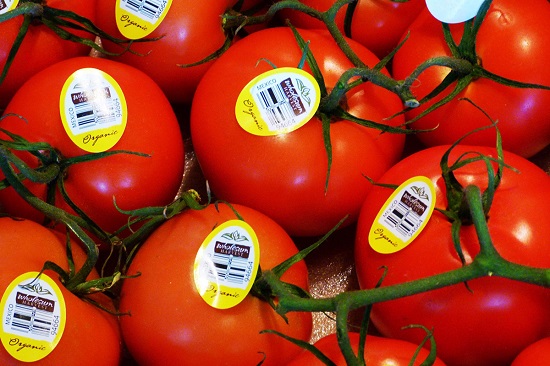EarthTalk®
From the Editors of E – The Environmental Magazine

Tomatoes are one of the produce aisle items on Environmental Working Group’s “Dirty Dozen” list of fruits and veggies that are worth spending extra on for organic varieties to spare yourself exposure to pesticide residues. Credit: Rusty Clark~100K Photos, FlickrCC.
Dear EarthTalk: My New Year’s resolution is to eat healthier. Which fruits and vegetables are worth spending extra money on for organic varieties? Likewise, is it worth it from the standpoint of health to also pay a premium for organic meat, cheese and eggs – P. McAdams, via email
It is indeed difficult to figure out which foods are worth spending more money on for organic varieties. Sure, you can just buy only organic in every category, but you’d end up spending upwards of 20 percent more every time you shopped. And certain “conventional” (i.e., non-organic) foods contain lots of pesticides and chemicals while others do not. Knowing where to draw the line in the grocery aisle is increasingly difficult given the profusion of organic choices these days. But luckily if you are armed with a few facts, you can eat healthier without breaking the bank.
As for produce, many conventionally grown fruits and vegetables don’t contain or pass along significant amounts of pesticides or other noxious chemicals. The non-profit Environmental Working Group (EWG) suggests only buying organic for their so-called “dirty dozen” list of common produce items that do tend to harbor larger amounts of chemicals: strawberries, spinach, nectarines, apples, peaches, pears, cherries, grapes, celery, tomatoes, sweet bell peppers and potatoes. Going for organic varieties of these fruits and vegetables is one of the most affordable ways to eat healthier because the price premium on organic produce is in many cases negligible given more consumer demand driving increased production and supply. On the flip side, EWG also produces the “Green Fifteen” list of produce that tends to be contaminant-free even when not organic: avocado, pineapple, onion, papaya, frozen sweet peas, sweet corn, eggplant, asparagus, cauliflower, cantaloupe, broccoli, mushrooms, cabbage, kiwi and honeydew melon.
As for animal products, organic varieties can only bear the U.S. Department of Agriculture (USDA) “Organic” stamp if they are “raised in living conditions accommodating their natural behaviors (like the ability to graze on pasture), fed 100% organic feed and forage, and not administered antibiotics or hormones.” As to whether organic meat is better for your health, don’t bet on it. A 2015 Spanish study found that consumption of organic meat does not diminish—and in fact might slightly increase—the risk of getting cancer. That said, other research has shown that organic meat contains more healthy Omega-3 unsaturated fats—this results from the animals eating grass not grain. Another good reason to go organic if you eat meat is ethics: Conventionally raised livestock are subject to confinement and overcrowding while being dosed with antibiotics to prevent the spread of bacterial infection in their midst. The same calculus applies to organic versus conventional dairy products: organic milk and cheese may contain more Omega-3s but otherwise the health differences are negligible.
It certainly is a balancing act today to shop with your family’s health and your own conscience in mind while not breaking the bank. The bright side of this conundrum is that we do have so many healthier choices overall these days, and it’s easier than any time in the last 75 years to avoid chemicals in your food if that’s the way you want to roll.
CONTACTS:
Environmental Working Group’s “Dirty Dozen,” ewg.org/foodnews/dirty-dozen.php;
“Consumption of organic meat does not diminish the carcinogenic potential associated with the intake of persistent organic pollutants (POPs),” https://pubmed.ncbi.nlm.nih.gov/25893622/
EarthTalk® is produced by Roddy Scheer & Doug Moss for the 501(c)3 nonprofit EarthTalk.
See more at https://emagazine.com
To donate, visit https//earthtalk.org
Send questions to: question@earthtalk.org
